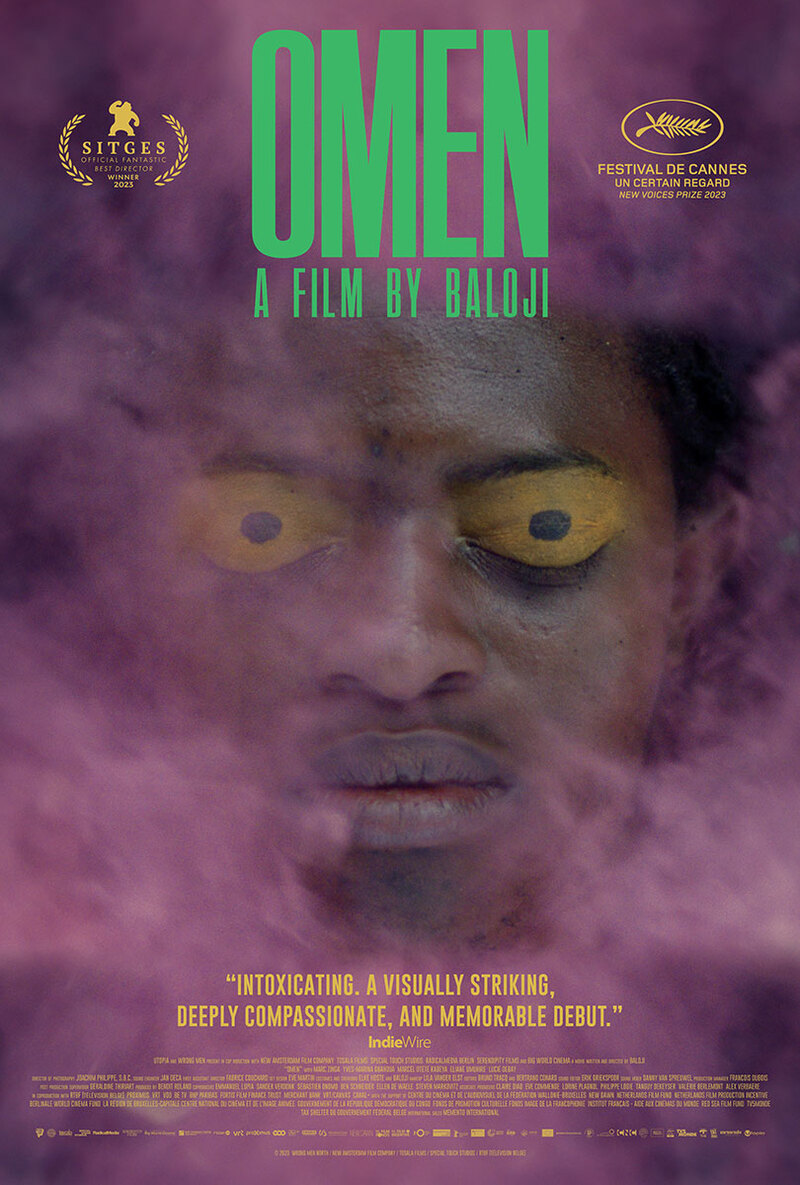
A Congolese emigrant is confronted with his culture's superstitions when
he returns home from Belgium with his pregnant white girlfriend.
Review by
Benjamin Poole
Directed by: Baloji
Starring: Marc Zinga, Lucie Debay, Eliane Umuhire, Yves-Marina Gnahoua

Belgian rapper Baloji, the mononymic writer/director (with script
help from Thomas van Zuylen) of Omen (not that one,
etc), is a force to be reckoned with. Awarded platinum records as a
musician in his late teens, and following a few well received acting
roles along with directing an experimental short film, this year the
auteur's feature length debut was selected as the Belgian entry for Best
International Feature Film at the Oscars. Fair play. Baloji's work often
draws upon his heritage and his familial relationships, with the
rapper's first solo album 'Hotel Impala' (2008, composed after he won a
national poetry competition-!) dedicated to his mother whom he had not
seen for over two decades (she "did not really understand it," the
rapper lamented). The strange, sometimes toxic, bonds of family and the
intractable shadow of identity are ideas Baloji has returned to
throughout his oeuvre and are explicitly explored within the vivid
mise-en-scene and kaleidoscopic narratives of Omen.

Omen's dominant story focuses on Koffi (Marc Zinga) and Alice (Lucie Debay), who are a good-looking young couple living in Belgium. Expecting
twins (aww!), the two want to get married, yet, due to the mandates of
Koffi's Congolese heritage, such a union entails a visit back to the
Congo for the approval of his family, a formality underlined by the
€5,000 dowry Koffi must give his dad. It probably doesn't help matters
that Alice is white, either...
The film opens upon a non-sequitur set within a burned desert of
scarecrows, wherein a mysterious figure expels lilac hued breast milk
into flowing water (I'd say it's not something you see every day, but I
watched
Sasquatch Sunset
with its violent lactation just last week...) establishing
Omen's characteristic visual language of symbolism and colour and preparing
us for its at times abstract approach. We then cut to the stark image of
Koffi facing us in close up, his afro dissected like that poor tree at
Hadrian's Wall. Before the fade in on Koffi, the film's first dialogue
comes from Alice: "It saddens me to cut your Afro," she says, while
Koffi stumbles to explain that he's doing it in prep for the forthcoming
family visit. A montage of Koffi combing his freshly shorn head and
practising what he is going to say to his Congolese kinspeople follows.
The display of male vulnerability, of reluctant duty to keep up
appearances, is a paradigm which Omen returns to in its
second interwoven story, which features street gangs of teenage boys;
one of the groups is seemingly opposed to gender conformity and knock
about in uniform pink dresses to honour of the death of their leader's
sister.

A final supplementary story features Koffi's own sister Tshala (Eliane Umuhire), who wants to move to South Africa in order to be with her boyfriend,
a process complicated by the inconvenience of an STD which was received
courtesy of his infidelity. In the same way the complementary hues of a
rainbow reinforce each other, the storylines of
Omen cooperate to throw light on the film's deeply
personal themes. It is fitting that a film so visually dynamic should be
sub-textually concerned with how we present ourselves to others, and how
others perceive us, regardless. Narratively, each thread shares the
worst-nightmare situation of frustration, of not getting anywhere
against punitive odds. When Koffi and Alice do arrive at the homestead,
the extended family seem disinterested in the return of their
son/brother and dismiss him with the childhood nickname "Zabalo", which
means "mark of the devil" - charming! The family are more interested in
a sister's new-born baby (boring), and when Koffi, holding the infant,
accidently nose bleeds on it, it all kicks off. Like, properly kicks
off: Koffi is subject to a brutally enacted spiritual ritual, involving
elaborate costumes and a helmet placed over his head, which is duly
macheted into. The shift in tone is so sudden and scary that you don't
have time to fully comprehend the absurdist implications until later: if
Koffi's family have all of this gear, and a "trial room" already set up,
then they must do this sort of thing regularly... No wonder Koffi moved
to Belgium, and perhaps understandable, too, that he feels he should
achieve some sort of closure before the creation of his own
family.

Despite its short running time it is impressive how richly detailed
Omen feels, how it so efficiently builds a world with
performances and direction that emotionally convince, even when the film
dips into dreamlike magic realism. Omen offers that same
off kilter quality that often occurs when artists from other disciplines
make films; David Byrne's True Stories or Prince's vanity
projects, say. There is an outsider perspective to such product, a
specific vision which is borne from an explicitly artistic intention,
even when the end products are hit and miss. In the case of Baloji's
Omen and its truly idiosyncratic nature, the hits keep on
coming.

Omen (Augure) is in UK cinemas
from April 26th.

